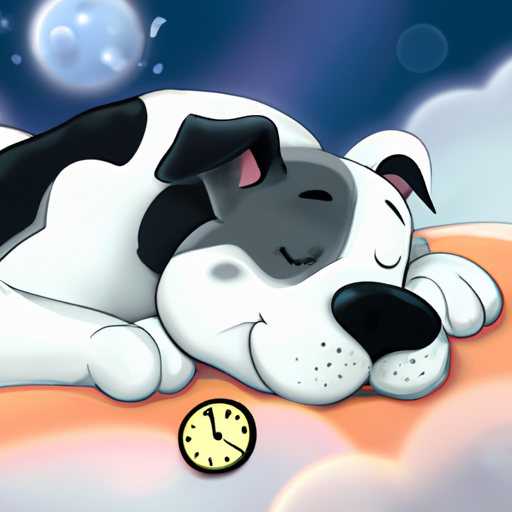Understanding Your Dog’s Sleep Pattern
As a caregiver, you are not only responsible for your dog’s physical well-being but also for their mental health. And a key aspect of their health revolves around their sleep cycle. Just like humans, dogs also need their beauty sleep.
You might have noticed that Fido seems to nap a lot more than you do. Are you wondering if that’s normal? Well, let’s dive into the fascinating world of canine sleep.
How Much Sleep Does Your Dog Actually Need?
On average, dogs spend about 12 to 14 hours per day sleeping. However, this can vary widely depending on factors such as:
- Age: Puppies and older dogs tend to sleep more.
- Breed: Larger breeds usually sleep more than smaller ones.
- Activity level: Dogs that are more active during the day sleep less.
Here’s a rough guide for you to follow:
| Age/Breed/Activity level | Average Sleep Duration |
|---|---|
| Puppy | 18-20 hours |
| Adult dog (small breed) | 12-14 hours |
| Adult dog (large breed) | 14-18 hours |
| Older dog | up to 20 hours |
| Highly active dog | 10-12 hours |
Factors Influencing Your Dog’s Sleep
Your dog’s sleep isn’t just influenced by their physical characteristics or activity level. Environmental factors and their overall health can also play a significant role.
- Stress and Anxiety: Like us, dogs can lose sleep due to stress or anxiety. Changes in their environment, separation anxiety, or loud noises can cause sleep disturbances.
- Health Issues: Certain health problems like arthritis, obesity, or respiratory issues can affect your dog’s sleep. If your dog seems to be sleeping too much or too little, it might be time for a vet visit.
- Diet and Exercise: A balanced diet and regular exercise play a crucial role in your dog’s sleep. An inactive dog or one with an unhealthy diet might sleep more.
Tips to Improve Your Dog’s Sleep
As a caregiver, it’s your job to ensure that your dog gets the rest they need. Here are a few tips to help improve your dog’s sleep:
- Create a Comfortable Sleep Environment: Ensure your dog has a quiet, comfortable place to rest. A good quality dog bed can make a big difference.
- Establish a Routine: Dogs thrive on routine. Having a consistent schedule for meals, walks, playtime, and bedtime can help regulate your dog’s sleep.
- Provide Adequate Exercise: Regular exercise not only keeps your dog healthy but also helps them sleep better.
- Monitor Their Diet: A balanced diet contributes to better sleep. Avoid feeding your dog late at night, as it might disrupt their sleep.
Frequently Asked Questions
Q: My dog seems to be sleeping all day. Is that normal?
A: While dogs do sleep a lot, excessive sleep can indicate health issues. If you’re concerned, it’s best to consult your vet.
Q: Does my dog have dreams?
A: Yes, dogs do dream! You might notice them twitching or whimpering in their sleep, which is a sign of dreaming.
Q: My dog seems restless at night. What can I do?
A: Restlessness can be a sign of discomfort or anxiety. Try improving their sleep environment or consult with your vet.
Q: Can I change my dog’s sleep schedule?
A: Yes, but do it gradually. Abrupt changes can cause stress and anxiety.
Remember, as a caregiver, your dog’s health and well-being are in your hands. By understanding their sleep needs and patterns, you can ensure they lead a happy and healthy life.



